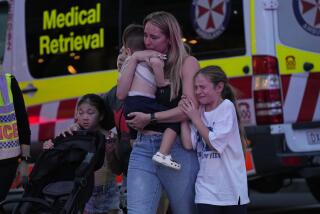Seeing God in storms’ wake
God is not an abstraction at Union University. Here, business classes might begin with a prayer. Biology students are encouraged to take creationism as seriously as they do evolution.
So what does it say about the nature of God that the campus was shredded Tuesday by a barrage of tornadoes? What does it say that no lives were lost, despite $40 million in damage?
Gregory A. Thornbury is relishing the opportunity to explore those questions when students return to the Southern Baptist campus, perhaps in the next few weeks. Thornbury, dean of Union’s school of Christian studies, says he plans to make the disaster -- and the response to it -- a catalyst for student discussions about responding through faith, and the opaque and sometimes baffling motives of God.
“If we didn’t, we’d have blown it,” Thornbury said Thursday, standing on the squishy carpet of the religious studies library. “We’re preparing people to become teachers of God’s word, to be missionaries, to be the leaders of relief organizations.”
As students returned to the west Tennessee campus to claim their smashed and overturned cars from the 1,000 that were wrecked by Tuesday’s winds, they marveled at the scope of the damage. All but one of Union’s 33 buildings had been hit; some fell to pieces.
They wondered how anyone managed to survive, and they wrestled aloud with the role God may have played in it all.
“I know God kept everyone at this school safe,” said Amber Campagna, 18, a freshman. “I don’t know why God let it happen -- but I really believe he was testing every student here.”
Crediting good fortune to providence is not uncommon at Union. When the $20-million science building was dedicated last year, Roy L. White, the primary donor, said: “I think God has got his hand on Union University.”
But Thornbury, a clean-cut, smiling presence in glasses and a wind-breaker, warned that guessing the mind of God was a tricky proposition for humans. To make his point, he quoted from Deuteronomy: “The secret things belong to the Lord our God.”
God’s motive for destroying the school, he said, “is probably in the realm of the things that belong to the Lord. . . . But what we can say is: ‘Look at the solidarity here. Why do we have people from the whole country rallying around this cause?’ I think that says something about what God has revealed to us.”
Though he expects the tornadoes will spark vigorous theological discussions in class, Thornbury said that the true lesson -- that people should respond to suffering with love and compassion -- was already manifesting itself.
Spokesman Tim Ellsworth noted that all 1,800 students living on campus had found a place to stay after they were evacuated Tuesday night. Since then, clothing donations and offers of help have been pouring in.
On Thursday, students and volunteers hustled to pack books and papers and remove them from Jennings Hall. The columned, neoclassical home of the Christian studies department suffered roof damage, broken windows and rain damage.
Young people swarmed other parts of the campus, happy to reconnect with friends as they salvaged what they could out of trashed dorms and wrecked cars.
Thornbury, who is also the campus pastor, interrupted a conversation when his cellphone rang with news of two students who remained in intensive care.
Later he discussed some of the lessons that could be taught. He spoke of Job, the good man whom God allowed to be burdened with great misfortunes.
He spoke of Rodney Stark, the contemporary sociologist who has argued that early Christian communities thrived in Greco-Roman cities thanks to the mutual aid they provided during disasters and plagues. “It’s not a religion of fear,” Thornbury said.
In the parking lot, a serene Alaina Bare picked out a few things from her PT Cruiser. It was dented and streaked with mud, and the windows were smashed. “I’m just thankful I’m alive,” said Bare, 22, who was raised in Ecuador by Christian missionary parents. “These things don’t really matter at all. God completely protected our lives, and that’s what matters.”
--
More to Read
Start your day right
Sign up for Essential California for news, features and recommendations from the L.A. Times and beyond in your inbox six days a week.
You may occasionally receive promotional content from the Los Angeles Times.






